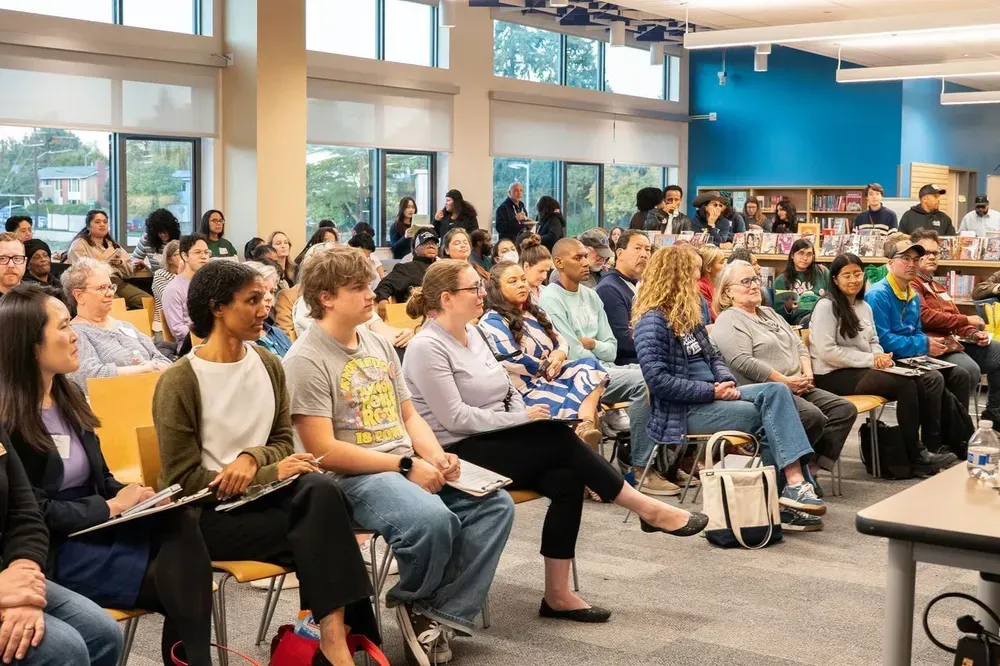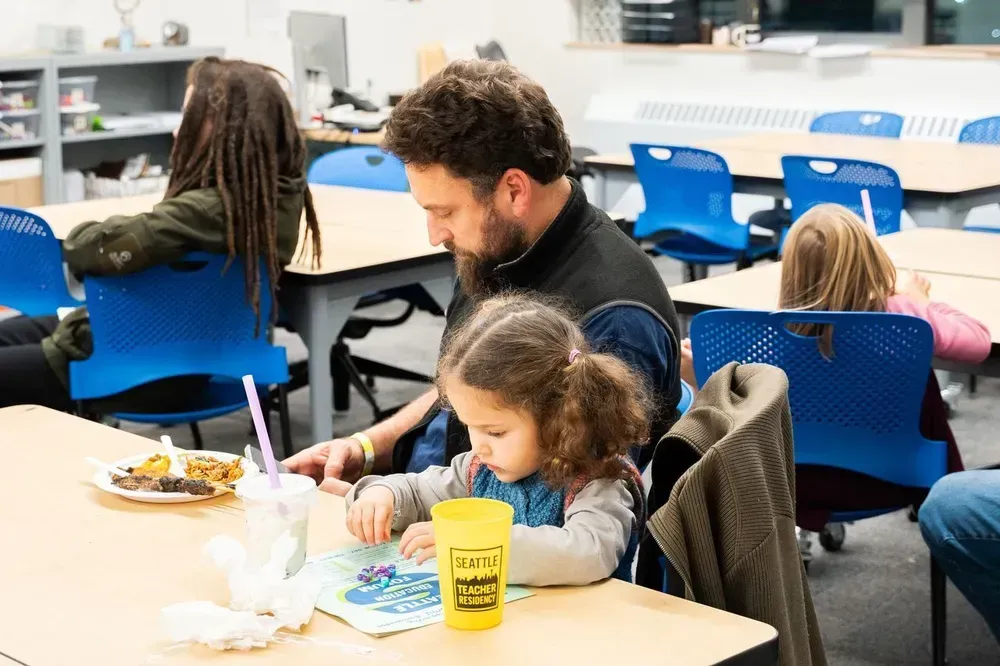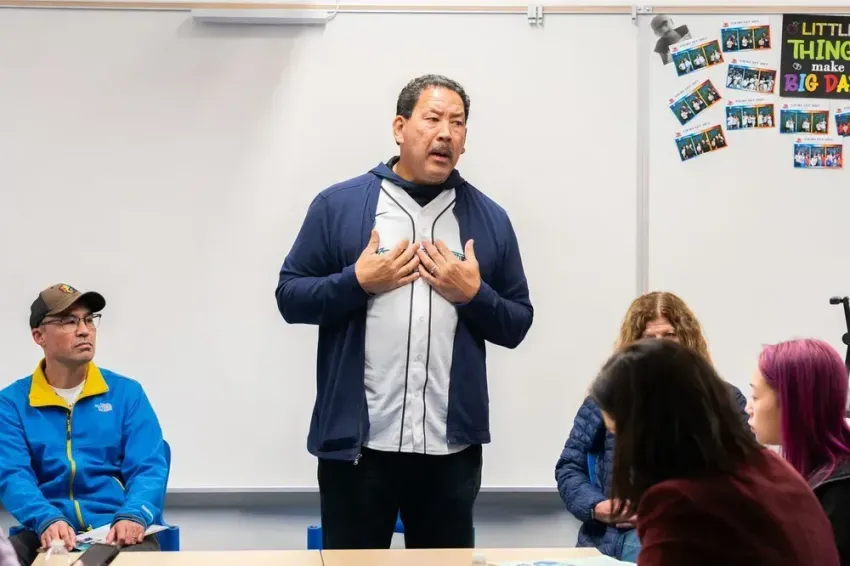For a dark time in national politics, the optimism at Rainier Beach High School certainly was as bright as the library’s fluorescent white lights. In a makeshift space between the two manga aisles, a group of young students welcomed guests to the forum and presented the evening’s subject: the well-being of Seattle’s next generation.
Sixteen candidates running in the upcoming general election, including Bruce Harrell, Katie Wilson, Sara Nelson, and Alexis Mercedes-Rinck, came to answer questions from students and parents alike, and to show their vision for the city’s public schools.
Diverging from the traditional town hall format, the candidates were instead separated into breakout rooms with groups of curious constituents, then rotated through them. As we went from room to room, here’s what we overheard.

In the science lab, Wilson and Nelson spoke with Howard, an older gentleman in a neon green raincoat, who wanted to know why City Hall has yet to consider a policy proposal from the 36th District Democrats that would require SPD officers to record the information of anyone they see performing stops, arrests, etc. who’s not a Washington police officer. The hope would be to deter any ICE officers from hiding their identity under a mask and/or everyday clothes.
Nelson wanted to know more about the legality of the proposal, and why Howard felt that Harrell’s recent $4 million investment in immigration legal aid wasn’t enough. After Howard provided specifics, Nelson said that if the mayor were to advocate for the policy, she wouldn’t object to its implementation.
Sydney, a Seattle Public Schools employee who brought along his first-grade daughter, asked about safety in the South End. Nelson said she’d be open to all “the tools in the toolbox,” including safety response officers (SROs), essentially police officers on school grounds.

Joe Mizrahi, a down-ballot candidate running for the school board, added his two cents to the conversation. Based on feedback he’s heard from families, he thinks that the conversation on “where to place SROs” has gotten too complicated. Most parents, according to Mizrahi, want to prevent violence around school grounds, not inside the school itself. So he proposed stationing SROs outside school grounds, allowing them inside for brief intervals and emergencies, but not to stay. Wilson agreed. Nelson didn’t respond to Mizrahi, and instead asked Sydney what he wanted to see happen.
“If there’s work in progress, we just want to see that demonstrated in our daily lives,” he said.
Across the hall in Ms. Patterson’s computer class, Eddie Lin was asked about recent cuts to scholarships meant for low-income students. Lin, interested in the bigger picture, chose to place the problem within the larger context of income inequality. When taxes aren’t equally paid across classes, according to Lin, the pressure to cut back on essential, equitable services will only continue.
“This is the issue of our time,” said Lin. “We need to change the power structure in Olympia and across our city.”
Harrell jumped on Lin’s bandwagon, framing the problem through the lens of policy. “Our country needs to be restructured,” said Harrell. “Which is why a lot of our policies are playing the long game, so that we can achieve true equity.”
Harrell and Lin continued their back-and-forth when the mayor was asked about protecting immigrants inside schools. Harrell brought up how he’s raised the budget of the Office of Refugees and Immigrant Affairs by 70% this year. Lin didn’t object to Harrell’s new budget but insisted on mentioning that the City still needed a concrete plan for protecting families on the perimeter of school grounds.
“Students and parents are protected when they’re in the building, sure,” said Lin. “but what about once they’re on the sidewalk? In the parking lot?”
Back at the library, when Nelson was asked about how to hold school boards accountable when marginalized students receive poor instruction, she scrambled to read a prewritten script off of her phone. Mizrahi and school board candidate Janis White saw an opportunity to provide a more candid response.
“We hear a lot of talk about improving literary instruction, but unless you have the resources to train educators, it won’t be done,” said White. “So we need to be present, visit school more often, and speak with our educators directly.”
“It’s all about giving proper support,” said Mizrahi. “We know that a student’s education, when we care and invest wisely, can go a long way.”
Support the Seattle Gay News: Celebrate 51 Years with Us!
As the third-oldest LGBTQIA+ newspaper in the United States, the Seattle Gay News (SGN) has been a vital independent source of news and entertainment for Seattle and the Pacific Northwest since 1974.
As we celebrate our 51st year, we need your support to continue our mission.
A monthly contribution will ensure that SGN remains a beacon of truth and a virtual gathering place for community dialogue.
Help us keep printing and providing a platform for LGBTQIA+ voices.
How you can donate!
Using this link: givebutter.com/6lZnDB
Text “SGN” to 53-555
Or Scan the QR code below!



